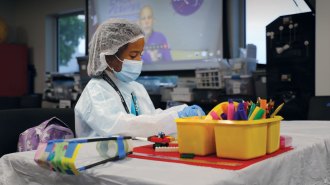Science & Society
Sign up for our newsletter
We summarize the week's scientific breakthroughs every Thursday.
-
 Science & Society
Science & Society50 years ago, UFO sightings in the United States went bust
In 1971, reports of unidentified flying objects were on the decline. Fifty years later, sightings have spiked thanks in part to pandemic lockdowns.
-
 Earth
EarthA new book uses stories from tsunami survivors to decode deadly waves
In ‘Tsunami: The World’s Greatest Waves,’ two scientists chronical hundreds of eyewitness accounts to show the human cost of life at the water’s edge.
By Sid Perkins -
 Science & Society
Science & SocietyMoral judgments about an activity’s COVID-19 risk can lead people astray
People use values and beliefs as a shortcut to determine how risky an activity is during the pandemic. Those biases can lead people astray.
By Sujata Gupta -
 Health & Medicine
Health & MedicineFood that boosts gut microbes could be a new way to help malnourished kids
Malnourished children in Bangladesh fed a food aimed at restoring gut health grew more than those who got a traditional high-calorie supplement.
-
 Science & Society
Science & SocietyHow science museums reinvented themselves to survive the pandemic
The pandemic forced science museums to reach out to their communities, and some built a wider following.
By Emily Anthes -
 Science & Society
Science & Society50 years ago, scientists predicted steady U.S. population growth
The country’s annual population growth rate, mostly stable since the 1970s, is now the lowest it’s been in over a century.
By Sujata Gupta -
 Archaeology
ArchaeologyTo find answers about the 1921 race massacre, Tulsa digs up its painful past
A century ago, hundreds of people died in a horrific eruption of racial violence in Tulsa. A team of researchers may have found a mass grave from the event.
-
 Science & Society
Science & SocietyA new memoir tells the life story of NASA ‘hidden figure’ Katherine Johnson
"My Remarkable Journey" gives the backstory of NASA mathematician Katherine Johnson, the central character of the 2016 film "Hidden Figures."
-
 Animals
AnimalsGray wolves scare deer from roads, reducing dangerous collisions
The predators use roads as travel corridors, creating “a landscape of fear” that keeps deer away and saves millions of dollars a year, a study finds.
By Jack J. Lee -
 Climate
ClimateClimate change disinformation is evolving. So are efforts to fight back
Researchers discuss effective ways to counter the changing tactics of climate denial.
-
 Psychology
PsychologySmall bribes may help people build healthy handwashing habits
Getting people to wash their hands is notoriously difficult. Doling out nice soap dispensers and rewards helps people develop the habit.
By Sujata Gupta -
 Science & Society
Science & SocietyVaccine hesitancy is nothing new. Here’s the damage it’s done over centuries
Pockets of people have railed against vaccines as long as the preventives have existed.
By Tara Haelle